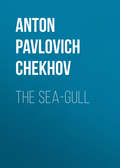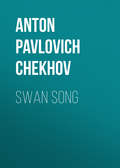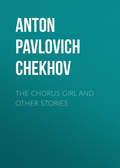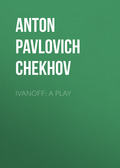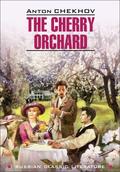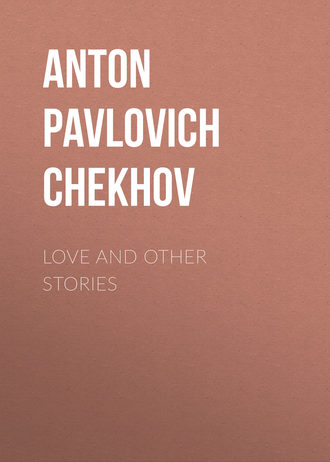
Антон Чехов
Love and Other Stories
THE COSSACK
MAXIM TORTCHAKOV, a farmer in southern Russia, was driving home from church with his young wife and bringing back an Easter cake which had just been blessed. The sun had not yet risen, but the east was all tinged with red and gold and had dissipated the haze which usually, in the early morning, screens the blue of the sky from the eyes. It was quiet… The birds were hardly yet awake.. The corncrake uttered its clear note, and far away above a little tumulus, a sleepy kite floated, heavily flapping its wings, and no other living creature could be seen all over the steppe.
Tortchakov drove on and thought that there was no better nor happier holiday than the Feast of Christ's Resurrection. He had only lately been married, and was now keeping his first Easter with his wife. Whatever he looked at, whatever he thought about, it all seemed to him bright, joyous, and happy. He thought about his farming, and thought that it was all going well, that the furnishing of his house was all the heart could desire – there was enough of everything and all of it good; he looked at his wife, and she seemed to him lovely, kind, and gentle. He was delighted by the glow in the east, and the young grass, and his squeaking chaise, and the kite… And when on the way, he ran into a tavern to light his cigarette and drank a glass, he felt happier still.
"It is said, 'Great is the day,'" he chattered. "Yes, it is great!
Wait a bit, Lizaveta, the sun will begin to dance. It dances every
Easter. So it rejoices too!"
"It is not alive," said his wife.
"But there are people on it!" exclaimed Tortchakov, "there are really! Ivan Stepanitch told me that there are people on all the planets – on the sun, and on the moon! Truly.. but maybe the learned men tell lies – the devil only knows! Stay, surely that's not a horse? Yes, it is!"
At the Crooked Ravine, which was just half-way on the journey home, Tortchakov and his wife saw a saddled horse standing motionless, and sniffing last year's dry grass. On a hillock beside the roadside a red-haired Cossack was sitting doubled up, looking at his feet.
"Christ is risen!" Maxim shouted to him. "Wo-o-o!"
"Truly He is risen," answered the Cossack, without raising his head.
"Where are you going?"
"Home on leave."
"Why are you sitting here, then?"
"Why.. I have fallen ill.. I haven't the strength to go on."
"What is wrong?"
"I ache all over."
"H'm. What a misfortune! People are keeping holiday, and you fall sick! But you should ride on to a village or an inn, what's the use of sitting here!"
The Cossack raised his head, and with big, exhausted eyes, scanned
Maxim, his wife, and the horse.
"Have you come from church?" he asked.
"Yes."
"The holiday found me on the high road. It was not God's will for me to reach home. I'd get on my horse at once and ride off, but I haven't the strength… You might, good Christians, give a wayfarer some Easter cake to break his fast!"
"Easter cake?" Tortchakov repeated, "That we can, to be sure..
Stay, I'll.."
Maxim fumbled quickly in his pockets, glanced at his wife, and said:
"I haven't a knife, nothing to cut it with. And I don't like to break it, it would spoil the whole cake. There's a problem! You look and see if you haven't a knife?"
The Cossack got up groaning, and went to his saddle to get a knife.
"What an idea," said Tortchakov's wife angrily. "I won't let you slice up the Easter cake! What should I look like, taking it home already cut! Ride on to the peasants in the village, and break your fast there!"
The wife took the napkin with the Easter cake in it out of her husband's hands and said:
"I won't allow it! One must do things properly; it's not a loaf, but a holy Easter cake. And it's a sin to cut it just anyhow."
"Well, Cossack, don't be angry," laughed Tortchakov. "The wife forbids it! Good-bye. Good luck on your journey!"
Maxim shook the reins, clicked to his horse, and the chaise rolled on squeaking. For some time his wife went on grumbling, and declaring that to cut the Easter cake before reaching home was a sin and not the proper thing. In the east the first rays of the rising sun shone out, cutting their way through the feathery clouds, and the song of the lark was heard in the sky. Now not one but three kites were hovering over the steppe at a respectful distance from one another. Grasshoppers began churring in the young grass.
When they had driven three-quarters of a mile from the Crooked
Ravine, Tortchakov looked round and stared intently into the distance.
"I can't see the Cossack," he said. "Poor, dear fellow, to take it into his head to fall ill on the road. There couldn't be a worse misfortune, to have to travel and not have the strength… I shouldn't wonder if he dies by the roadside. We didn't give him any Easter cake, Lizaveta, and we ought to have given it. I'll be bound he wants to break his fast too."
The sun had risen, but whether it was dancing or not Tortchakov did not see. He remained silent all the way home, thinking and keeping his eyes fixed on the horse's black tail. For some unknown reason he felt overcome by depression, and not a trace of the holiday gladness was left in his heart. When he had arrived home and said, "Christ is risen" to his workmen, he grew cheerful again and began talking, but when he had sat down to break the fast and had taken a bite from his piece of Easter cake, he looked regretfully at his wife, and said:
"It wasn't right of us, Lizaveta, not to give that Cossack something to eat."
"You are a queer one, upon my word," said Lizaveta, shrugging her shoulders in surprise. "Where did you pick up such a fashion as giving away the holy Easter cake on the high road? Is it an ordinary loaf? Now that it is cut and lying on the table, let anyone eat it that likes – your Cossack too! Do you suppose I grudge it?"
"That's all right, but we ought to have given the Cossack some… Why, he was worse off than a beggar or an orphan. On the road, and far from home, and sick too."
Tortchakov drank half a glass of tea, and neither ate nor drank anything more. He had no appetite, the tea seemed to choke him, and he felt depressed again. After breaking their fast, his wife and he lay down to sleep. When Lizaveta woke two hours later, he was standing by the window, looking into the yard.
"Are you up already?" asked his wife.
"I somehow can't sleep… Ah, Lizaveta," he sighed. "We were unkind, you and I, to that Cossack!"
"Talking about that Cossack again!" yawned his wife. "You have got him on the brain."
"He has served his Tsar, shed his blood maybe, and we treated him as though he were a pig. We ought to have brought the sick man home and fed him, and we did not even give him a morsel of bread."
"Catch me letting you spoil the Easter cake for nothing! And one that has been blessed too! You would have cut it on the road, and shouldn't I have looked a fool when I got home?"
Without saying anything to his wife, Maxim went into the kitchen, wrapped a piece of cake up in a napkin, together with half a dozen eggs, and went to the labourers in the barn.
"Kuzma, put down your concertina," he said to one of them. "Saddle the bay, or Ivantchik, and ride briskly to the Crooked Ravine. There you will see a sick Cossack with a horse, so give him this. Maybe he hasn't ridden away yet."
Maxim felt cheerful again, but after waiting for Kuzma for some hours, he could bear it no longer, so he saddled a horse and went off to meet him. He met him just at the Ravine.
"Well, have you seen the Cossack?"
"I can't find him anywhere, he must have ridden on."
"H'm.. a queer business."
Tortchakov took the bundle from Kuzma, and galloped on farther.
When he reached Shustrovo he asked the peasants:
"Friends, have you seen a sick Cossack with a horse? Didn't he ride by here? A red-headed fellow on a bay horse."
The peasants looked at one another, and said they had not seen the
Cossack.
"The returning postman drove by, it's true, but as for a Cossack or anyone else, there has been no such."
Maxim got home at dinner time.
"I can't get that Cossack out of my head, do what you will!" he said to his wife. "He gives me no peace. I keep thinking: what if God meant to try us, and sent some saint or angel in the form of a Cossack? It does happen, you know. It's bad, Lizaveta; we were unkind to the man!"
"What do you keep pestering me with that Cossack for?" cried Lizaveta, losing patience at last. "You stick to it like tar!"
"You are not kind, you know." said Maxim, looking into his wife's face.
And for the first time since his marriage he perceived that he wife was not kind.
"I may be unkind," cried Lizaveta, tapping angrily with her spoon, "but I am not going to give away the holy Easter cake to every drunken man in the road."
"The Cossack wasn't drunk!"
"He was drunk!"
"Well, you are a fool then!"
Maxim got up from the table and began reproaching his young wife for hard-heartedness and stupidity. She, getting angry too, answered his reproaches with reproaches, burst into tears, and went away into their bedroom, declaring she would go home to her father's. This was the first matrimonial squabble that had happened in the Tortchakov's married life. He walked about the yard till the evening, picturing his wife's face, and it seemed to him now spiteful and ugly. And as though to torment him the Cossack haunted his brain, and Maxim seemed to see now his sick eyes, now his unsteady walk.
"Ah, we were unkind to the man," he muttered.
When it got dark, he was overcome by an insufferable depression such as he had never felt before. Feeling so dreary, and being angry with his wife, he got drunk, as he had sometimes done before he was married. In his drunkenness he used bad language and shouted to his wife that she had a spiteful, ugly face, and that next day he would send her packing to her father's. On the morning of Easter Monday, he drank some more to sober himself, and got drunk again.
And with that his downfall began.
His horses, cows, sheep, and hives disappeared one by one from the yard; Maxim was more and more often drunk, debts mounted up, he felt an aversion for his wife. Maxim put down all his misfortunes to the fact that he had an unkind wife, and above all, that God was angry with him on account of the sick Cossack.
Lizaveta saw their ruin, but who was to blame for it she did not understand.
ABORIGINES
BETWEEN nine and ten in the morning. Ivan Lyashkevsky, a lieutenant of Polish origin, who has at some time or other been wounded in the head, and now lives on his pension in a town in one of the southern provinces, is sitting in his lodgings at the open window talking to Franz Stepanitch Finks, the town architect, who has come in to see him for a minute. Both have thrust their heads out of the window, and are looking in the direction of the gate near which Lyashkevsky's landlord, a plump little native with pendulous perspiring cheeks, in full, blue trousers, is sitting on a bench with his waistcoat unbuttoned. The native is plunged in deep thought, and is absent-mindedly prodding the toe of his boot with a stick.
"Extraordinary people, I tell you," grumbled Lyashkevsky, looking angrily at the native, "here he has sat down on the bench, and so he will sit, damn the fellow, with his hands folded till evening. They do absolutely nothing. The wastrels and loafers! It would be all right, you scoundrel, if you had money lying in the bank, or had a farm of your own where others would be working for you, but here you have not a penny to your name, you eat the bread of others, you are in debt all round, and you starve your family – devil take you! You wouldn't believe me, Franz Stepanitch, sometimes it makes me so cross that I could jump out of the window and give the low fellow a good horse-whipping. Come, why don't you work? What are you sitting there for?"
The native looks indifferently at Lyashkevsky, tries to say something but cannot; sloth and the sultry heat have paralysed his conversational faculties… Yawning lazily, he makes the sign of the cross over his mouth, and turns his eyes up towards the sky where pigeons fly, bathing in the hot air.
"You must not be too severe in your judgments, honoured friend," sighs Finks, mopping his big bald head with his handkerchief. "Put yourself in their place: business is slack now, there's unemployment all round, a bad harvest, stagnation in trade."
"Good gracious, how you talk!" cries Lyashkevsky in indignation, angrily wrapping his dressing gown round him. "Supposing he has no job and no trade, why doesn't he work in his own home, the devil flay him! I say! Is there no work for you at home? Just look, you brute! Your steps have come to pieces, the plankway is falling into the ditch, the fence is rotten; you had better set to and mend it all, or if you don't know how, go into the kitchen and help your wife. Your wife is running out every minute to fetch water or carry out the slops. Why shouldn't you run instead, you rascal? And then you must remember, Franz Stepanitch, that he has six acres of garden, that he has pigsties and poultry houses, but it is all wasted and no use. The flower garden is overgrown with weeds and almost baked dry, while the boys play ball in the kitchen garden. Isn't he a lazy brute? I assure you, though I have only the use of an acre and a half with my lodgings, you will always find radishes, and salad, and fennel, and onions, while that blackguard buys everything at the market."
"He is a Russian, there is no doing anything with him," said Finks with a condescending smile; "it's in the Russian blood… They are a very lazy people! If all property were given to Germans or Poles, in a year's time you would not recognise the town."
The native in the blue trousers beckons a girl with a sieve, buys a kopeck's worth of sunflower seeds from her and begins cracking them.
"A race of curs!" says Lyashkevsky angrily. "That's their only occupation, they crack sunflower seeds and they talk politics! The devil take them!"
Staring wrathfully at the blue trousers, Lyashkevsky is gradually roused to fury, and gets so excited that he actually foams at the mouth. He speaks with a Polish accent, rapping out each syllable venomously, till at last the little bags under his eyes swell, and he abandons the Russian "scoundrels, blackguards, and rascals," and rolling his eyes, begins pouring out a shower of Polish oaths, coughing from his efforts. "Lazy dogs, race of curs. May the devil take them!"
The native hears this abuse distinctly, but, judging from the appearance of his crumpled little figure, it does not affect him. Apparently he has long ago grown as used to it as to the buzzing of the flies, and feels it superfluous to protest. At every visit Finks has to listen to a tirade on the subject of the lazy good-for-nothing aborigines, and every time exactly the same one.
"But.. I must be going," he says, remembering that he has no time to spare. "Good-bye!"
"Where are you off to?"
"I only looked in on you for a minute. The wall of the cellar has cracked in the girls' high school, so they asked me to go round at once to look at it. I must go."
"H'm… I have told Varvara to get the samovar," says Lyashkevsky, surprised. "Stay a little, we will have some tea; then you shall go."
Finks obediently puts down his hat on the table and remains to drink tea. Over their tea Lyashkevsky maintains that the natives are hopelessly ruined, that there is only one thing to do, to take them all indiscriminately and send them under strict escort to hard labour.
"Why, upon my word," he says, getting hot, "you may ask what does that goose sitting there live upon! He lets me lodgings in his house for seven roubles a month, and he goes to name-day parties, that's all that he has to live on, the knave, may the devil take him! He has neither earnings nor an income. They are not merely sluggards and wastrels, they are swindlers too, they are continually borrowing money from the town bank, and what do they do with it? They plunge into some scheme such as sending bulls to Moscow, or building oil presses on a new system; but to send bulls to Moscow or to press oil you want to have a head on your shoulders, and these rascals have pumpkins on theirs! Of course all their schemes end in smoke.. They waste their money, get into a mess, and then snap their fingers at the bank. What can you get out of them? Their houses are mortgaged over and over again, they have no other property – it's all been drunk and eaten up long ago. Nine-tenths of them are swindlers, the scoundrels! To borrow money and not return it is their rule. Thanks to them the town bank is going smash!"
"I was at Yegorov's yesterday," Finks interrupts the Pole, anxious to change the conversation, "and only fancy, I won six roubles and a half from him at picquet."
"I believe I still owe you something at picquet," Lyashkevsky recollects, "I ought to win it back. Wouldn't you like one game?"
"Perhaps just one," Finks assents. "I must make haste to the high school, you know."
Lyashkevsky and Finks sit down at the open window and begin a game of picquet. The native in the blue trousers stretches with relish, and husks of sunflower seeds fall in showers from all over him on to the ground. At that moment from the gate opposite appears another native with a long beard, wearing a crumpled yellowish-grey cotton coat. He screws up his eyes affectionately at the blue trousers and shouts:
"Good-morning, Semyon Nikolaitch, I have the honour to congratulate you on the Thursday."
"And the same to you, Kapiton Petrovitch!"
"Come to my seat! It's cool here!"
The blue trousers, with much sighing and groaning and waddling from side to side like a duck, cross the street.
"Tierce major." mutters Lyashkevsky, "from the queen..
Five and fifteen… The rascals are talking of politics..
Do you hear? They have begun about England. I have six hearts."
"I have the seven spades. My point."
"Yes, it's yours. Do you hear? They are abusing Beaconsfield. They don't know, the swine, that Beaconsfield has been dead for ever so long. So I have twenty-nine… Your lead."
"Eight.. nine.. ten.. Yes, amazing people, these Russians! Eleven.. twelve… The Russian inertia is unique on the terrestrial globe."
"Thirty.. Thirty-one… One ought to take a good whip, you know. Go out and give them Beaconsfield. I say, how their tongues are wagging! It's easier to babble than to work. I suppose you threw away the queen of clubs and I didn't realise it."
"Thirteen.. Fourteen… It's unbearably hot! One must be made of iron to sit in such heat on a seat in the full sun! Fifteen."
The first game is followed by a second, the second by a third… Finks loses, and by degrees works himself up into a gambling fever and forgets all about the cracking walls of the high school cellar. As Lyashkevsky plays he keeps looking at the aborigines. He sees them, entertaining each other with conversation, go to the open gate, cross the filthy yard and sit down on a scanty patch of shade under an aspen tree. Between twelve and one o'clock the fat cook with brown legs spreads before them something like a baby's sheet with brown stains upon it, and gives them their dinner. They eat with wooden spoons, keep brushing away the flies, and go on talking.
"The devil, it is beyond everything," cries Lyashkevsky, revolted. "I am very glad I have not a gun or a revolver or I should have a shot at those cattle. I have four knaves – fourteen… Your point… It really gives me a twitching in my legs. I can't see those ruffians without being upset."
"Don't excite yourself, it is bad for you."
"But upon my word, it is enough to try the patience of a stone!"
When he has finished dinner the native in blue trousers, worn out and exhausted, staggering with laziness and repletion, crosses the street to his own house and sinks feebly on to his bench. He is struggling with drowsiness and the gnats, and is looking about him as dejectedly as though he were every minute expecting his end. His helpless air drives Lyashkevsky out of all patience. The Pole pokes his head out of the window and shouts at him, spluttering:
"Been gorging? Ah, the old woman! The sweet darling. He has been stuffing himself, and now he doesn't know what to do with his tummy! Get out of my sight, you confounded fellow! Plague take you!"
The native looks sourly at him, and merely twiddles his fingers instead of answering. A school-boy of his acquaintance passes by him with his satchel on his back. Stopping him the native ponders a long time what to say to him, and asks:
"Well, what now?"
"Nothing."
"How, nothing?"
"Why, just nothing."
"H'm… And which subject is the hardest?"
"That's according." The school-boy shrugs his shoulders.
"I see – er.. What is the Latin for tree?"
"Arbor."
"Aha… And so one has to know all that," sighs the blue trousers.
"You have to go into it all… It's hard work, hard work..
Is your dear Mamma well?"
"She is all right, thank you."
"Ah… Well, run along."
After losing two roubles Finks remembers the high school and is horrified.
"Holy Saints, why it's three o'clock already. How I have been staying on. Good-bye, I must run.."
"Have dinner with me, and then go," says Lyashkevsky. "You have plenty of time."
Finks stays, but only on condition that dinner shall last no more than ten minutes. After dining he sits for some five minutes on the sofa and thinks of the cracked wall, then resolutely lays his head on the cushion and fills the room with a shrill whistling through his nose. While he is asleep, Lyashkevsky, who does not approve of an afternoon nap, sits at the window, stares at the dozing native, and grumbles:
"Race of curs! I wonder you don't choke with laziness. No work, no intellectual or moral interests, nothing but vegetating.. disgusting. Tfoo!"
At six o'clock Finks wakes up.
"It's too late to go to the high school now," he says, stretching.
"I shall have to go to-morrow, and now… How about my revenge?
Let's have one more game.."
After seeing his visitor off, between nine and ten, Lyashkevsky looks after him for some time, and says:
"Damn the fellow, staying here the whole day and doing absolutely nothing… Simply get their salary and do no work; the devil take them!.. The German pig.."
He looks out of the window, but the native is no longer there. He has gone to bed. There is no one to grumble at, and for the first time in the day he keeps his mouth shut, but ten minutes passes and he cannot restrain the depression that overpowers him, and begins to grumble, shoving the old shabby armchair:
"You only take up room, rubbishly old thing! You ought to have been burnt long ago, but I keep forgetting to tell them to chop you up. It's a disgrace!"
And as he gets into bed he presses his hand on a spring of the mattress, frowns and says peevishly:
"The con – found – ed spring! It will cut my side all night. I will tell them to rip up the mattress to-morrow and get you out, you useless thing."
He falls asleep at midnight, and dreams that he is pouring boiling water over the natives, Finks, and the old armchair.



